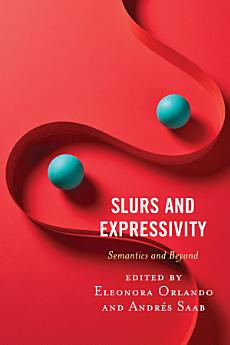Slurs and Expressivity: Semantics and Beyond
Eleonora Orlando · Andrés Saab
এপ্ৰিল ২০২১ · Bloomsbury Publishing PLC
ইবুক
256
পৃষ্ঠা
reportমূল্যাংকন আৰু পৰ্যালোচনা সত্যাপন কৰা হোৱা নাই অধিক জানক
এই ইবুকখনৰ বিষয়ে
Slurs and Expressivity: Semantics and Beyond, edited by Eleonora Orlando and Andres Saab,focuses on the analysis of the expressive aspects of slur-words, namely, those words prima facie related to the conveyance of contemptuous or derogatory feelings for the members of a certain group of people identified in terms of their ethnicity, sexual orientation, religion, political ideology, and other personal qualities. In as far as they are used to express emotional attitudes, slurs are, thus, a kind of expressive words. This collection provides different hypotheses regarding the way in which the expressive import of slurs and other related expressive words is semantically encoded in the grammar and how their meaning impacts other aspects related to their use in different practices of linguistic communication. These linguistic practices are usually, but not always, related to segregation and discrimination of particular human groups. Therefore, any contribution to the theory of slur meaning is, directly or indirectly, also a contribution to a better understanding of those practices and to finding the best way to eradicate them.
লিখকৰ বিষয়ে
Eleonora Orlando is professor of philosophy at the University of Buenos Aires and researcher at the Argentine National Scientific and Technical Research Council.
Andrés Saab is professor of linguistics at the University of Buenos Aires and researcher at the Argentine National Scientific and Technical Research Council.
Andrés Saab is professor of linguistics at the University of Buenos Aires and researcher at the Argentine National Scientific and Technical Research Council.
এই ইবুকখনক মূল্যাংকন কৰক
আমাক আপোনাৰ মতামত জনাওক।
পঢ়াৰ নির্দেশাৱলী
স্মাৰ্টফ’ন আৰু টেবলেট
Android আৰু iPad/iPhoneৰ বাবে Google Play Books এপটো ইনষ্টল কৰক। ই স্বয়ংক্রিয়ভাৱে আপোনাৰ একাউণ্টৰ সৈতে ছিংক হয় আৰু আপুনি য'তে নাথাকক ত'তেই কোনো অডিঅ'বুক অনলাইন বা অফলাইনত শুনিবলৈ সুবিধা দিয়ে।
লেপটপ আৰু কম্পিউটাৰ
আপুনি কম্পিউটাৰৰ ৱেব ব্রাউজাৰ ব্যৱহাৰ কৰি Google Playত কিনা অডিঅ'বুকসমূহ শুনিব পাৰে।
ই-ৰীডাৰ আৰু অন্য ডিভাইচ
Kobo eReadersৰ দৰে ই-চিয়াঁহীৰ ডিভাইচসমূহত পঢ়িবলৈ, আপুনি এটা ফাইল ডাউনল’ড কৰি সেইটো আপোনাৰ ডিভাইচলৈ স্থানান্তৰণ কৰিব লাগিব। সমৰ্থিত ই-ৰিডাৰলৈ ফাইলটো কেনেকৈ স্থানান্তৰ কৰিব জানিবলৈ সহায় কেন্দ্ৰত থকা সবিশেষ নিৰ্দেশাৱলী চাওক।




